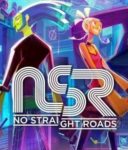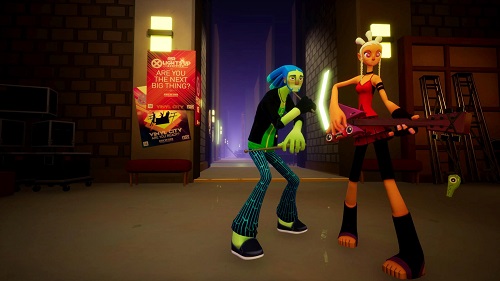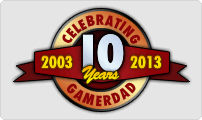No Straight Roads (PS4, Switch, Xbox One, PC)
 Mayday and Zuke are in an indie rock band and they live in Vinyl City. Mayday is the guitarist and Zuke is the drummer. The city they live in is powered by music, provided by the NSR power company. Musicians can audition to be part of NSR, but when Mayday and Zuke try out, they are rejected. Later they find out their power output was higher than anyone else’s, and that NSR is withholding power and electricity to everyone except the very elite. And now they’ve banned rock and roll, too! Mayday and Zuke decide to use their rock music to rebel and take back the city for everyone in No Straight Roads. It’s kind of like a video game version of the 80’s song, “We Built this City on Rock and Roll.” It’s a 3-D platformer with an emphasis on multi-tiered boss fights and music timing gameplay. The game is available on most current consoles and PC, but reviewed on PS4 here.
Mayday and Zuke are in an indie rock band and they live in Vinyl City. Mayday is the guitarist and Zuke is the drummer. The city they live in is powered by music, provided by the NSR power company. Musicians can audition to be part of NSR, but when Mayday and Zuke try out, they are rejected. Later they find out their power output was higher than anyone else’s, and that NSR is withholding power and electricity to everyone except the very elite. And now they’ve banned rock and roll, too! Mayday and Zuke decide to use their rock music to rebel and take back the city for everyone in No Straight Roads. It’s kind of like a video game version of the 80’s song, “We Built this City on Rock and Roll.” It’s a 3-D platformer with an emphasis on multi-tiered boss fights and music timing gameplay. The game is available on most current consoles and PC, but reviewed on PS4 here.
You control Mayday and Zuke in 3-D space as they run around the city and hijack concerts from the other NSR members. You can switch between the two characters at any time, or you can play co-op. I wasn’t able to do that due to social distancing, but it sounds neat. Mayday uses her guitar to attack and is focused on strength, while Zuke is weaker but uses his drumsticks for combo moves. Both characters can run, jump, attack, collect music notes and fire them as projectiles, and use special moves.
The flow of the game works like this. You explore a part of a linear city until you reach an end. Then you jump down to a new part of the city and find one of the NSR members having a concert. To hijack their concert, you must play a short platforming section before reaching the boss. The bosses you fight are the meat of the gameplay. They have multiple forms, and take a good while to defeat. Most of their attacks are timed with the music, but there are also usually picture cues as well.
The bosses represent different music types, such as an intergalactic techno DJ, a Hatsune Miku-like virtual idol, a child prodigy park concert piano player, a robot boy band, and more! Each fight also tells a small story, so it kind of reminded me of Psychonauts a little. Depending on how well you do after the fight, you’ll earn a rating and a number of fans. Use the fans to upgrade Mayday and Zuke’s skills. You have unlimited tries to keep continuing to defeat the boss right where you left off, but your rating will suffer if you do that. But luckily this means that players of any skill level can at least see the game to the end. Which is good because the game is really hard!
After you beat a boss, you’ll be able to explore a new part of the city and start the process over again. You can also replay old boss battles to get a better rating and more fans. Hidden in the city are batteries that you can collect, and when you have enough, you can use them to power up things in the city to get even more fans. You can also find hidden stickers to put on your instruments to give you temporary upgrades, too.
The game does have a few problems, though. One is that some goals and objectives and just gameplay points are sometimes unclear at first, so the learning curve is a bit steep at the beginning. I appreciate them not spoonfeeding the gamer too much, but there is a difference between that and good instructions. One example in the game is a rap battle mini-game with Zuke’s brother. You move a couple of hands while icons scroll down. But what they don’t tell you is that you have to AVOID the icons, whereas in every other music game you’re supposed to run into them! There’s examples of that all throughout the game. Another big problem is that there is too much story and exposition. I felt like I watched the game just as much as I played it. Luckily the story and characters are charming, but I could’ve done with a bit less prattle. Other minor problems include floaty jumping controls, but luckily you don’t need to do too much precise platforming here. And Mayday’s voice actress couldn’t decide what accent she should have.
But despite the problems, I still saw the game to the end. It’s not a perfect game, but you can really tell the developers put their heart and soul into the project, and you don’t see that much anymore. So if you enjoyed platformers and story based music games from the 2000’s era, you may want to check out No Straight Roads.
Kid Factor:
No Straight Roads is rated E-10 with ESRB descriptors of Alcohol Reference, Fantasy Violence, and Language. You hit cartoony people and monsters with guitars and drumsticks, and fire music notes like projectiles. After battles, the characters in the story scenes look a little scuffed up, but that’s about as violent as it gets. In one cutscene, a character breaks a bottle of wine, and near the end of the game, a couple of characters say a bad word. Reading skill is needed for the text, and younger gamers may find it too difficult.






October 24th, 2020 at 9:16 am
I like the look of this game. The premise sounds like a 1980s C64 game though.